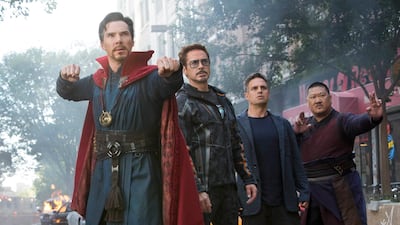Ten years and 18 films, since the 2008 release of Iron Man, is how long Marvel Studios have been building up to this momentous ensemble piece, which its directors, the Russo Brothers, have described as "the beginning of the end" of this cycle of the Marvel Cinematic Universe.
Perhaps the biggest question ahead of the huge production was “Can the Russos successfully squeeze 412 superheroes we’ve been intricately introduced to over the course of the previous 18 movies, as well as another 600 you vaguely remember from a cameo in some film six years ago, into a film that makes any sense?” The answer is a resounding yes, and they do so while deftly managing to give all the central characters enough screentime to seem a vital part of the movie, but none so much that they appear to be the star.
At times, the story feels like a much-loved soap opera as the niggles and relationships of the massive cast play out on screen, while even characters that have shared little or no screen time in previous instalments manage to strike up convincing relationships, complete with the banter and bickering we expect from our Marvel heroes. The Guardians of the Galaxy, in particular, slot effortlessly into the Avengers' world on their debut, with a hilarious bout of "out-duding" each other between Star Lord and Thor. Thor's hastily assembled new team of himself, Rocket Racoon and Teen Groot (grumpier than Baby Groot, and with an irritating addiction to hand-held video games), or "Rabbit and Tree" as Thor names them, are deserving of a comedy spin-off franchise by itself.
It’s not all buddy comedy, however. The mood shifts from one-liners to kitchen sink drama to downright bleak throughout, without ever jarring greatly. Surprise is the Russo’s main weapon here. We never know what’s coming next, and while the overall plot is a typical superhero yarn involving mystical all-powerful stones and a megalomaniac villain, there’s an unexpected amount of emotion, moral quandary and political subtext attached to place the movie on a level above pure blockbuster fare.
We were all expecting a degree of “readjustment” among the central characters to prepare the franchise for its next phase, but quite how few punches the Russo’s pull from the very opening scenes is perhaps the biggest surprise of all – I left the film feeling simultaneously elated and utterly depressed, and there were fans sat around me with their heads in their hands as the final credits rolled.
The villain, Thanos, meanwhile, is one of the most complex I can think of in any superhero movie. We’ve been briefly introduced to him in previous movies and post-credit clips, but this is the first time we’ve seen him in his all-powerful glory.
Rather than the usual supervillain aim of destroying, or at least ruling, the universe, Thanos strangely only wants to destroy half of it. His logic is that the universe’s resources are finite, and by wiping out half the population randomly, with no regard for wealth or status, the surviving half can live in a world of plenty. It’s an argument that carries an undeniable if sociopathic, logic in a world of growing overcrowding and dwindling natural resources.
His aim after carrying out his dastardly plan, meanwhile, is not to rule this new depleted world, but to go home and “watch the sun rise” over it, in its newly sustainable state.
His complicated, to put it mildly, relationship with his runaway daughter, Guardian of the Galaxy Gomora, who has sworn to kill her father, adds another welcome layer to what is far from your standard two-dimensional movie villain.
There are plenty of punch-ups and special effects for action fans too and the film is visually impressive throughout, including some epic battle scenes when Thanos' legions face off against the forces of justice in Wakanda – when Chadwick Boseman's King T'challa vowed to open his hidden, utopian, African nation to the world at the end of Black Panther just three months ago in Earth time, his people probably didn't expect a mammoth battle for the future of humanity to be the first fruit of his policy.
When it comes to the actual comic books, I've always been a bigger fan of Marvel's main rival DC. Their stories have always struck me as more serious, darker, and more appropriate to a post-teen audience. When it comes to movies, however, after Marvel's last couple of outings, I finally have to concede that they have the competition on the canvas. And films like Infinity War and the Russo's 2016 Captain America: Civil War lead to the suspicion that the knockabout fun of the earlier Marvel films may have been put in place purely to heighten the effect of seeing it brutally snatched away a decade or so later. I say this entirely as a compliment.
Avengers: Infinity War screens across the UAE on April 26
__________________
Read more:
5 takeaways from the final trailer for Avengers: Infinity War
Watch: Official trailer drops for Avengers: Infinity War
From Iron Man to Wonder Woman: The endless love affair with superhero movies
__________________

